The main theme of the 48th Session of the Commission on Narcotic Drugs was HIV/AIDS prevention among drug users. However, none of the adopted resolutions mentioned harm reduction or syringe exchange. Two reprepresentatives of HCLU participated as members of the OSI delegation, read their short report on the event.
Opening Speeches
Antonio Maria Costa, Executive Director of UNODC refused criticisms coming from civil society (or as he put it the “pro-drug lobby”) concerning the effectiveness of UN measures aiming to eliminate or significantly reduce drug cultivation, trafficking and use until 2008. He said there was a progress since 2003 and the present “balanced approach is most appropriate” to achieve the goals set in the 1998 action plan. He denied that legalization can lead to curb crime and emphasized that there is no choice for governments between health and security. Mr. Costa called UNODC the “counter-narcotic conscience of the world,” and said only political capital is missing behind its efforts. He pointed out that the spread of HIV/AIDS, the lack of road testing and the rise of raves are three major problems challenging the international narcotic control system. Notwithstanding, his speech did not answer the crucial questions about HIV/AIDS prevention among injecting drug users. He countered the issue of harm reduction saying that all UNODC activities are indeed harm reduction activities, for instance to provide alternative crops for farmers in the third world. According to Mr. Costa abstinence is the best form to tackle the HIV/AIDS problem and he claimed drug users cannot think rationally and act responsibly, so the only way to reduce the risks of HIV transmission is to diminish drug phenomena as such. He talked much more about raves, calling them “drug festivals” where young people dance several hours and than drive their cars under the influence of drugs, causing road accidents.
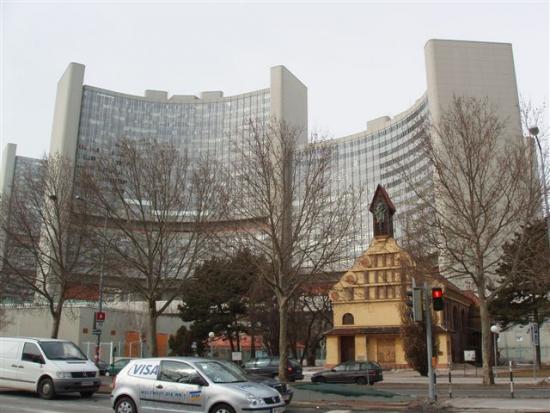
The UN building in Vienna (photo: Marek Zygadlo)
John Walters, head of ONDCP did not address the issue of syringe exchange directly as several NGOs expected. His speech was rather an optimistic overview of American drug policy with several referrals to increasing funds to treat drug addiction and to decreasing drug use among adolescents. He claimed that addiction is a “fundamental disease of the brain caused by repeated drug use according to best science.” This “deadly disease” is a preventable condition and active drug users should be restored to community. He stated that effective drug treatment services and drug testing in schools are working interventions to curb the disease of addiction and said using the criminal system to provide alternative treatment for drug users instead of imprisonment is “extremely successful intervention” that saves lives. He called delegated of the CND to keep existing unity in the battle against narco-terrorists and implement the three UN conventions, which are accepted by the overwhelming majority of states. He rejected injecting rooms and heroine maintenance programs because they facilitate drug use and emphasized that strict anti-narcotic measures are adequate responses to HIV/AIDS epidemic. The “drug czar” claimed
Thematic Debate on HIV/AIDS
Peter Piot, director of the UNAIDS chaired the thematic debate on HIV/AIDS. He stressed the importance of growing feminization of the HIV/AIDS epidemic (in the occasion of the International Women’s Day). There is a rapid growth of new infections if HIV/AIDS enters an IDU community, he said. It is not easy but possible to stop the epidemic, though only really comprehensive strategies work. Prevention of drug use is the number one priority, but it is important to prevent the transmission of HIV/AIDS among active drug users, with providing them access to treatment, substitution therapy, voluntary testing, counselling, access to clean syringes and ARV. There is a need for a dialogue between the world of drug control and the world of HIV prevention, which is missing in many countries. He expressed his hopes that UNODC will establish this dialogue in the international level as the donor of UNAIDS this year.
substitution therapy as effective tools. Even if there is a controversy around providing injecting equipment, there is relatively robust evidence that these measures are effective. As the representative pointed out, WHO and INCB also acknowledged this. The prevalence of HCV is worryingly high in
measures should be implemented.
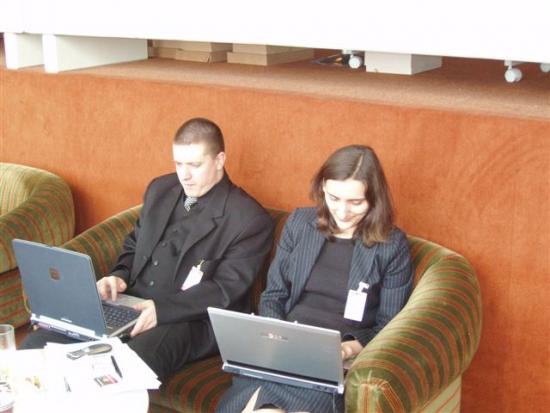
Peter Sarosi (HCLU) and Raminta Stuikyte (CEEHRN) during break (photo: Marek Zygadlo)
The delegate of
population is covered by HR programs. These drug users do not share injection equipment any more and there is a universal access to ARV. In addition, there are prevention campaigns in schools organized in partnership with the Ministry of Education, and harm reduction trainings have been established in primary health care.
The representative of the
The delegate of
HIV/AIDS forced to rethink the drug policy of
The delegate of the
According to its delegate,
The delegate of WHO reported that 4 million IDUs are living with HIV/AIDS today, and this number is increasing. There is an urgent need for effective HIV prevention among IDUs and universal access to ARV. Drug treatment should remain important but it is not enough to stop the epidemic. At least six interventions should be implemented in all affected regions of the world:
1, needle exchange
2, substitution therapy
3, HIV testing/counselling
4, peer based outreach work
5, services for preventing sexual transmission (condom distribution)
6, HBV vaccination
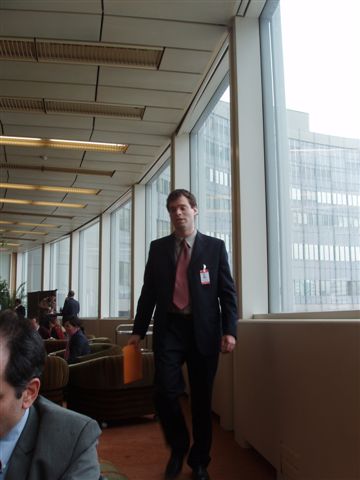
There is a great diversity among IDUs should be respected, special groups should be targeted (women, sex workers, prisoners, ethnic minorities etc.). Effective harm reduction measures are still not available in many countries despite good evidence. WHO promotes evidence-based prevention, harm reduction and public health response in its global strategy on HIV/AIDS accepted in 2003. Only small proportion of IDUs has access to ARV (10% of people in need), this is unacceptable.
The delegate of
message.
The Council of Europe emphasized a need for pro-active and timely prevention of HIV/AIDS and effective risk reduction, which should be 1) comprehensive 2) adapted to real circumstances and 3) evaluated, monitored, effective and cost-effective. The Pompidou Group accepted a draft resolution on ST accepted by CND as well. Outreach work and early detection of problems is very important.
NGO speeches
The distinguished delegate of the International Red Cross mentioned that his organization released a document on reducing risk behaviour among IDUs in December 2003. According to this document, harm reduction measures should be implemented and CND should accept concrete measures with timelines to stop the spread of the epidemic. The Red Cross published a document entitled „Spreading the Light of Science” which is a guideline for states how to implement effective harm reduction strategies. Red Cross recommends countries to take this guideline into consideration while introducing new measures against HIV/AIDS.
Mauro Guarinieri (chair of the European AIDS Treatment Group) is the first HIV positive activist speaking at the plenary meeting of the Commission on Narcotic Drugs. He called CND for widening the access to life-saving medical treatment for people living with HIV/AIDS. Only 1 percent of injecting drug users has access to antiretroviral treatment in Eastern-Europe, said Mr. Guarinieri. He urged delegates to increase the coverage of methadone substitution treatment (which is still illegal in several states including
Marco Perduca, the delegate of the Transnational Radical Party (TRP) had two speeches. At the thematic debate on HIV/AIDS he criticized harsh drug laws sentencing drug users to long imprisonment for a victimless crime and called for the implementation of harm reduction measures in prisons. In his second speech Mr. Perduca recommended the Commission to legalize and industrialize coca production in Latin-America for non-narcotic purposes.
Resolutions
Despite the fact that this year the main theme of the CND was HIV/AIDS prevention, only three resolutions were submitted by different member states addressing this issue and only two of them were accepted in a revised form by the Committee. The most progressive draft resolution was submitted by the government of
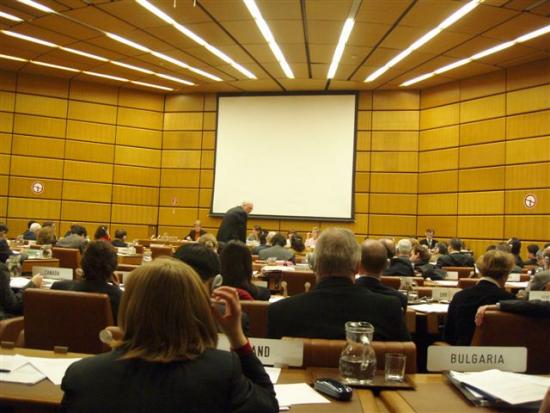
Discussion of the resolutions at the CND (photo: Marek Zygadlo)
OSI luncheon
The largest side event of the 48th Session of the Commission on Narcotic drugs was the luncheon organized by the Brazilian National AIDS Program, the Human Rights Watch and the Open Society Institute on Thursday afternoon. More than 50 country delegates from various countries accepted our invitation and came to listen to our spkeakers (even if the US held a luncheon in the next room at the same time). After a short welcome speech by Daniel Wolfe, Deputy Director of the International Harm Reduction Development Program and Jonathan Cohen (Human Rights Watch), Joanne Csete (Canadian HIV/AIDS Alliance) introduced the advantages of a public health and human rights oriented approach in drug policy. Cristina Pimenta, Chif of the Bazilian National AIDS Program emphasized the effectiveness of needle exchange and substitution services introduced to her country in the past decade. Alexandr Zelichenko, former Deputy Director of the State Commission on Drug Control in Kyrgiztan, explained his personal experiences leading him from harsh prohibitionism to harm reduction, from operative police actions to human rights advocacy. Mauro Guarinieri (EATG) spoke on behalf of those people living with HIV/AIDS and hepatitis C, urging political decision makers to provide access to health care and prevention services for injecting drug users. Copies of the sing-on letter were widely distributed in English, French, Spanish and Russian language to the country delegates.
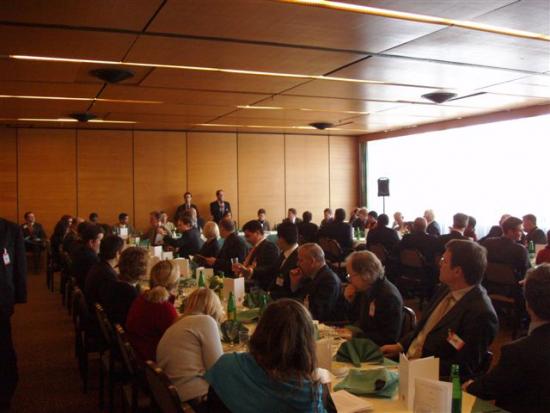
The OSI luncheon (photo: Marek Zygadlo)
The last battle
On the last day of the CND the Commission discussed the adoption of resolutions and draft reports. Bolivia and Brazil expressed their disappointment and concern on the suspension of the L. 14 resolution and asked the Commission to reflect their initiative in the report. Malaysia questioned the 6. paragraph of the draft report on the thematic debate on HIV/AIDS claiming that the text does not mirror the real situation that is many countries who did participate in the debate were against the implementation of harm reduction measures. They immediately got support from the Japanese, the Swedish and the US delegates. However, the negotiator of the Netherlands called the CND to keep insist on the original text, saying that the report should record the speeches and not the silence. Several European countries formed into line behind the Netherlands and the plenary discussion was suspended for at least half an hour, while negotiators reached consensus in informal debates. Russia also expressed its concerns about some sentences of the report on the thematic debate on HIV/AIDS. In the end consensus was reached and the chairman dissolved the 48th session of the Commission.
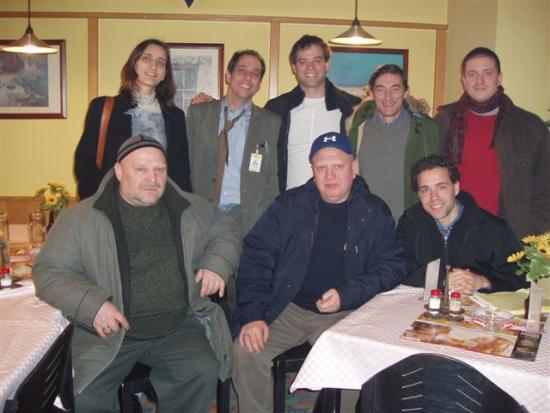
"The OSI team" (photo: Marek Zygadlo)
Line above: Raminta Stuikite (Executive Director, CEEHRN), Daniel Wolfe (Deputy Director, OSI/IHRD), Balázs Dénes (Executive Director, HCLU), Mauro Guarinieri (Chief, EATG), Péter Sárosi (Drug Policy Project Coordinator, HCLU) Below: Marek Zygadlo (head of the Krakow Monar), Alexander Zelichenko (former Chief of Kyrgiz Special Drug Control Service), Jonathan Cohen (HIV/AIDS Researcher, Human Rights Watch)



